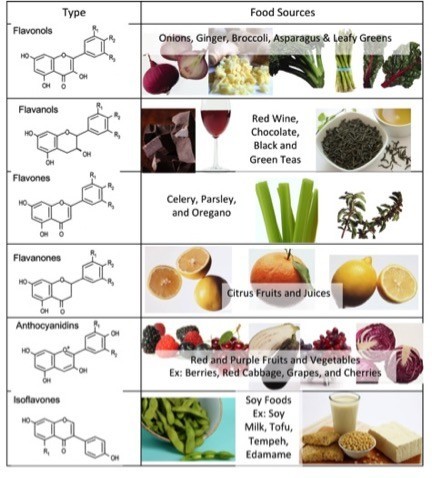Every time you eat chocolate covered berries or drink a cup of tea, you are getting a dose of flavonoids! Flavonoids are compounds found in plant foods that are well studied for their role in preventing cancers, as well as other chronic diseases.
A new study of Australian women looked at the role of flavonoids in preventing death from all causes, including cancer and heart disease specifically. Researchers found that women with the highest intake of flavonoids experienced 62% fewer deaths during the course of the 5 year study compared to those who consumed the least, with similar lower risk from cancer and hear disease.
Flavonoids are generally divided into 6 groups. Foods provide different flavonoids and so may have different health benefits.

Source: USDA Database for Flavonoid Content of Selected Foods
The women in this study consumed most (about 80%) of their flavonoids from black tea, which contains flavanols. The women were not, however, eating many foods like blueberries, cherries, and red cabbage that belong to a group called anthocyanins. They also were probably not seasoning their food with a lot of parsley or oregano that contain flavones. Flavanol intake — almost all from tea — was linked to a lower risk of death, but researchers could not find the same lower risk of death from anthocyanin or flavone intake.
What does this tell us?
For one, if you are similar to these Australian women, you probably are not consuming a variety of flavonoids. Eating a variety of different colored fruits and vegetables can help to give you flavonoids from all six groups. Also, it’s possible that in order to get the beneficial effects of flavonoids, we have to consume enough of them.
What can you do to increase your flavonoid intake?
- Drink More Tea: Tea can help you start your day (and pick you up in the afternoon) with flavonoids. In the study, the highest flavonoid intake was equal to about 4-5 cups of tea daily.
- Eat a Rainbow of Fruits and Veggies: Instead of eating the same foods everyday, mix it up to make sure you are getting all the different flavonoids. Use the chart above to make sure you are eating from every group and check out AICR’s Healthy Recipes ideas!
- Add a Moderate Amount of Soy Foods: Try edamame for a healthy snack or substitute tofu or tempeh for your protein at dinner! Visit AICR’s Foods that Fight Cancer: Soy for information on soy, including delicious recipe ideas!
For information on how much flavonoids specific foods have, visit the USDA Flavonoid database.
Samantha Tryon, MA, MS, is currently completing her dietetic internship at the National Institutes of Health. Sam is a former high school teacher who is passionate about making science information accessible to the public and promoting healthy behaviors and a positive body image.





